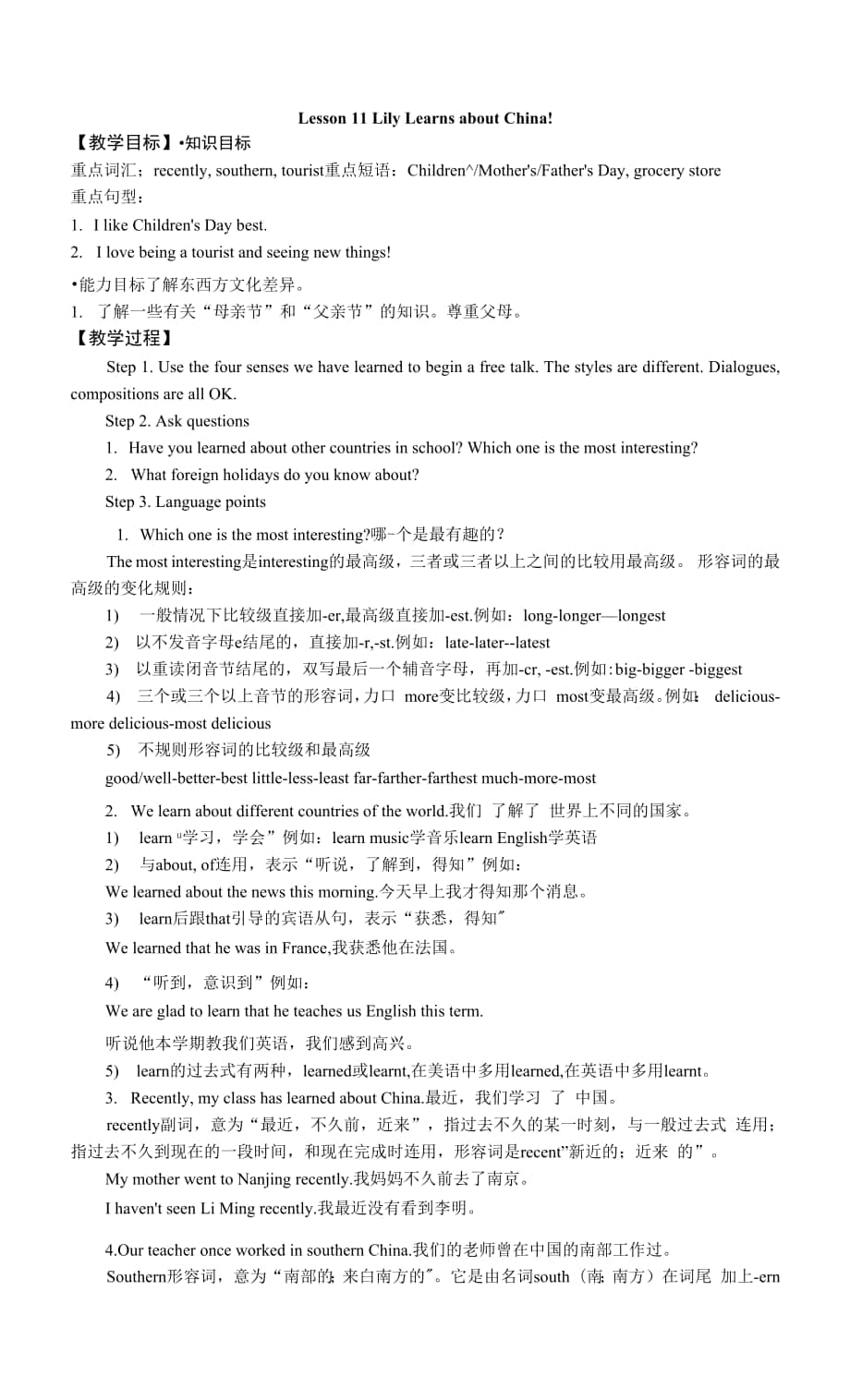《八年級冀教版上冊Lesson11 Lily Learns about China教案.docx》由會(huì)員分享����,可在線閱讀,更多相關(guān)《八年級冀教版上冊Lesson11 Lily Learns about China教案.docx(2頁珍藏版)》請?jiān)谘b配圖網(wǎng)上搜索�。
1�����、Lesson 11 Lily Learns about China!
【教學(xué)目標(biāo)】?知識目標(biāo)
重點(diǎn)詞匯�����;recently, southern, tourist重點(diǎn)短語:Children^/Mother's/Father's Day, grocery store
重點(diǎn)句型:
1. I like Children's Day best.
2. I love being a tourist and seeing new things!
?能力目標(biāo)了解東西方文化差異�。
1. 了解一些有關(guān)“母親節(jié)”和“父親節(jié)”的知識���。尊重父母���。
【教學(xué)過程】
Step 1. Use the four
2、senses we have learned to begin a free talk. The styles are different. Dialogues, compositions are all OK.
Step 2. Ask questions
1. Have you learned about other countries in school? Which one is the most interesting?
2. What foreign holidays do you know about?
Step 3. Language points
1. Which o
3��、ne is the most interesting?哪-個(gè)是最有趣的����?
The most interesting是interesting的最高級,三者或三者以上之間的比較用最高級����。 形容詞的最高級的變化規(guī)則:
1) 一般情況下比較級直接加-er,最高級直接加-est.例如:long-longer—longest
2) 以不發(fā)音字母e結(jié)尾的����,直接加-r,-st.例如:late-later--latest
3) 以重讀閉音節(jié)結(jié)尾的����,雙寫最后一個(gè)輔音字母�,再加-cr, -est.例如:big-bigger -biggest
4) 三個(gè)或三個(gè)以上音節(jié)的形容詞,力口 more變比較級��,力口
4����、most變最高級。例如: delicious-more delicious-most delicious
5) 不規(guī)則形容詞的比較級和最高級
good/well-better-best little-less-least far-farther-farthest much-more-most
2. We learn about different countries of the world.我們 了解了 世界上不同的國家���。
1) learn u學(xué)習(xí)�����,學(xué)會(huì)”例如:learn music學(xué)音樂learn English學(xué)英語
2) 與about, of連用��,表示“聽說���,了解到,得知”例
5��、如:
We learned about the news this morning.今天早上我才得知那個(gè)消息。
3) learn后跟that引導(dǎo)的賓語從句��,表示“獲悉�,得知"
We learned that he was in France,我獲悉他在法國。
4) “聽到���,意識到”例如:
We are glad to learn that he teaches us English this term.
聽說他本學(xué)期教我們英語�����,我們感到高興�。
5) learn的過去式有兩種����,learned或learnt,在美語中多用learned,在英語中多用learnt。
3. Recent
6����、ly, my class has learned about China.最近,我們學(xué)習(xí) 了 中國�。
recently副詞,意為“最近��,不久前��,近來”,指過去不久的某一時(shí)刻��,與一般過去式 連用���;指過去不久到現(xiàn)在的一段時(shí)間,和現(xiàn)在完成時(shí)連用��,形容詞是recent”新近的�����;近來 的”����。
My mother went to Nanjing recently.我媽媽不久前去了南京。
I haven't seen Li Ming recently.我最近沒有看到李明��。
4.Our teacher once worked in southern China.我們的老師曾在中國的南部工作過�����。
So
7���、uthern形容詞��,意為“南部的��;來白南方的"�。它是由名詞south(南;南方)在詞尾 加上-ern構(gòu)成的形容詞�。South和southern在句中nJ以進(jìn)行同義句轉(zhuǎn)換。類似的詞還有 northern, eastern, western.
We like living in southern China.
We like living in the south of China.
We like living in the southern part of China.
我們喜歡住在中國南方��。
5.1 love being a tourist and seeing new thing
8�����、s!我喜歡成為一名游客�,見識新事物! tourist可數(shù)名詞����,意為“游客;游人;觀光者”����。由tour加后綴.ist構(gòu)成的名詞。Tour 既可用作名詞也可用作動(dòng)詞�����,意為“旅行;游歷��;觀光”����。
Why does the tourist want to go to the post office?這名游客為什么想去郵局����?
We'll tour the world.我們將周游世界。
6. A few days ago, our teacher took us to a Chinese groceiy store and a Chinese restaurant. 幾 天前�����,我們老師帶我們?nèi)チ艘粋€(gè)
9�、中國雜貨店和一個(gè)中國飯店。
1 )took是take的過去式����。"take...to..."把某人帶到某地
Please take the box to the next room,請把這個(gè)箱子搬到隔壁的屋子。
His father always takes him to (he park on Sunday,每逢星期天����,他的父親總是帶他去公園。 2)grocery store 意為“雜貨店二
I often go (o the grocery store to buy things.我經(jīng)常去雜貨帶你買東西�����。
7. Mother's Day and Father's Day 母親節(jié)和父
10、親節(jié)����。
Mother's Day and Father's Day是單數(shù)名詞家's構(gòu)成,以s結(jié)尾的復(fù)數(shù)名詞只加'�,不以 s結(jié)尾的復(fù)數(shù)名詞仍要加,s.
Childrcifs Day 兒童節(jié)�����,Women's Day 婦女節(jié) Teachers' Day 教師節(jié)
Step 4 Discussion
1. Say something about what our country is like in your eyes?
2. Talk about the important festivals in our country and in Canada. Compare the differences between them.
Step 5 HomeworkLily has learned a lot about China. Think of some things she may not know about your hometown. Write a letter to her about them.
 八年級冀教版上冊Lesson11 Lily Learns about China教案.docx
八年級冀教版上冊Lesson11 Lily Learns about China教案.docx

